2020年高考英语复习《必修一Unit 5 Nelson Mandela-amodern hero》:单句语法填空
- 格式:docx
- 大小:16.02 KB
- 文档页数:1
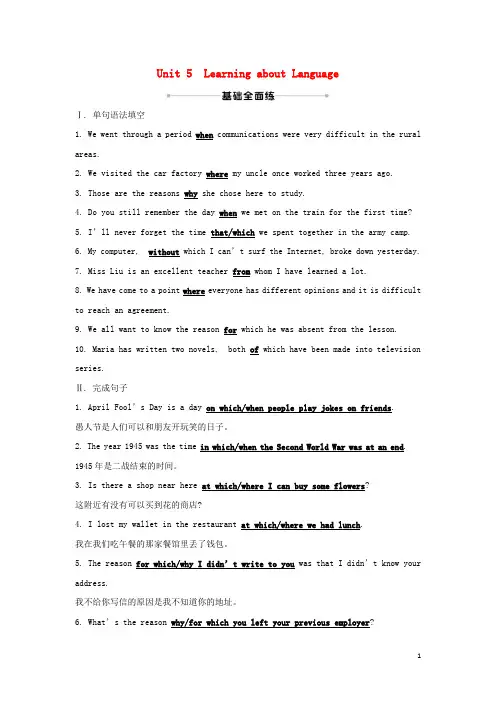
Unit 5 Learning about LanguageⅠ. 单句语法填空1. We went through a period when communications were very difficult in the rural areas.2. We visited the car factory where my uncle once worked three years ago.3. Those are the reasons why she chose here to study.4. Do you still remember the day when we met on the train for the first time?5. I’ll never forget the time that/which we spent together in the army camp.6. My computer, without which I can’t surf the Internet, broke down yesterday.7. Miss Liu is an excellent teacher from whom I have learned a lot.8. We have come to a point where everyone has different opinions and it is difficult to reach an agreement.9. We all want to know the reason for which he was absent from the lesson.10. Maria has written two novels, both of which have been made into television series.Ⅱ. 完成句子1. April Fool’s Day is a day on which/when people play jokes on friends.愚人节是人们可以和朋友开玩笑的日子。
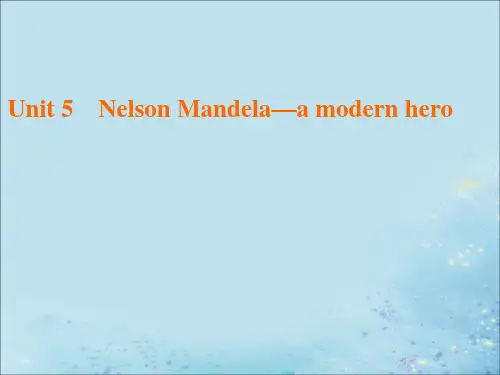
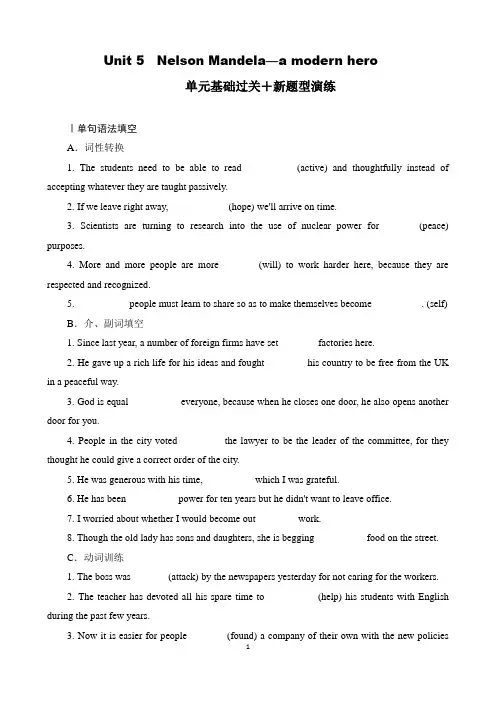
Unit 5Nelson Mandela—a modern hero单元基础过关+新题型演练Ⅰ单句语法填空A.词性转换1. The students need to be able to read ________ (active) and thoughtfully instead of accepting whatever they are taught passively.2. If we leave right away, ________ (hope) we'll arrive on time.3. Scientists are turning to research into the use of nuclear power for________(peace) purposes.4. More and more people are more________(will) to work harder here, because they are respected and recognized.5. ______ people must learn to share so as to make themselves become ________. (self)B.介、副词填空1. Since last year, a number of foreign firms have set________factories here.2. He gave up a rich life for his ideas and fought ________his country to be free from the UK in a peaceful way.3. God is equal ________ everyone, because when he closes one door, he also opens another door for you.4. People in the city voted ________ the lawyer to be the leader of the committee, for they thought he could give a correct order of the city.5. He was generous with his time, ________ which I was grateful.6. He has been ________ power for ten years but he didn't want to leave office.7. I worried about whether I would become out ________work.8. Though the old lady has sons and daughters, she is begging ________ food on the street.C.动词训练1. The boss was _____ (attack) by the newspapers yesterday for not caring for the workers.2. The teacher has devoted all his spare time to ________ (help) his students with English during the past few years.3. Now it is easier for people________(found) a company of their own with the new policiesgoing on.4. The government is taking some measures to make all the children in our country well ________(educate).5. The criminal(罪犯), who ________ (sentence) to 4 years in prison by the judge last week, is 21 years old.6. What he said at the meeting was equal to _____ (express) that he didn't agree to the plan.7. He thought of a very good way to stop the car ________ (steal).8. The manager tells the workers that being late for 5 times means ____ (leave) the company.9. All citizens who are over 18 years old, except those illegal ones, have the right________(vote).10. There is a notice saying: anyone returning the ring will ________ (reward).D.单句填空1. In time we reached a stage ________ we had more young readers than old ones.2. Tom ________ have come to his friend's birthday party, but he was too busy yesterday.3. Many countries are setting up parks________animals and plants can be protected.4. It's said that he's leaving here. As________matter of fact, he's going to have a higher position.5. Only then ________ she realize how much damage had been caused by the earthquake.Ⅱ短语填空1. Almost everyone thinks Mike________________(胜任) the position as manager.2. They had planned to _____________ (炸毁) the bridge but their bombs failed to explode.3. Whenever you meet new words, you'd better guess them before____________(求助) others.4. The moment they arrived there, they began to ________________ (搭建) the tent.5. You should never ________________ (失去信心) although you are a little behind others.6. Many people________________(选举) that kind and talented man to be their new leader in last election.7. Whenever my boss sees me _____________ (无事可做), he finds something for me to do.8. Jack was caught again when he was trying________________ (从……中逃跑) the prison.9. It has been 5 years since the new president ________________ (上台).10. He appears to be healthy, but ______________ (实际上) he suffers from a very weakheart.Ⅲ句型训练1. 曾经有一段时间这类音乐相当流行,因此我对它很熟悉。
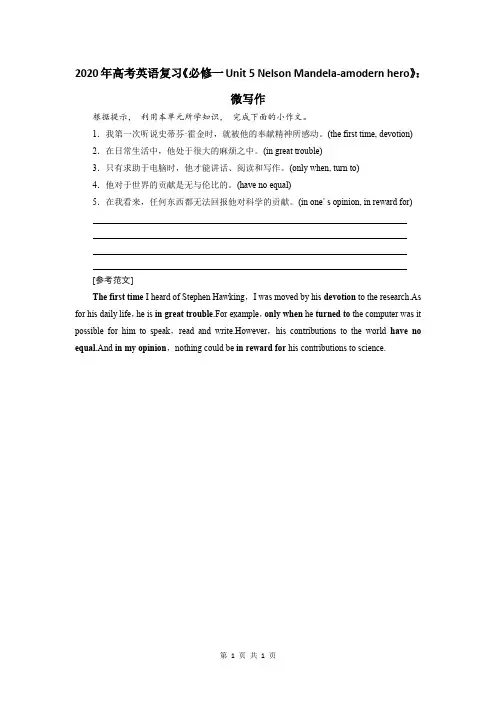
2020年高考英语复习《必修一Unit 5 Nelson Mandela-amodern hero》:
微写作
根据提示,利用本单元所学知识,完成下面的小作文。
1.我第一次听说史蒂芬·霍金时,就被他的奉献精神所感动。
(the first time, devotion) 2.在日常生活中,他处于很大的麻烦之中。
(in great trouble)
3.只有求助于电脑时,他才能讲话、阅读和写作。
(only when, turn to)
4.他对于世界的贡献是无与伦比的。
(have no equal)
5.在我看来,任何东西都无法回报他对科学的贡献。
(in one's opinion, in reward for)
[参考范文]
The first time I heard of Stephen Hawking,I was moved by his devotion to the research.As for his daily life,he is in great trouble.For example,only when he turned to the computer was it possible for him to speak,read and write.However,his contributions to the world have no equal.And in my opinion,nothing could be in reward for his contributions to science.
第1 页共1 页。
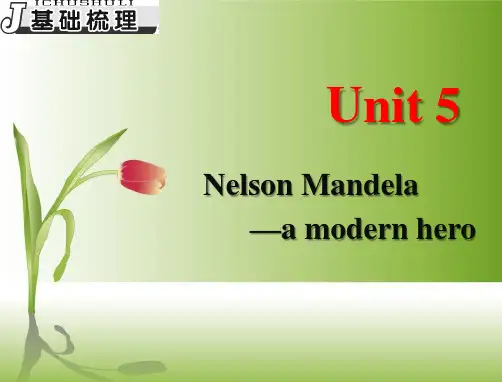
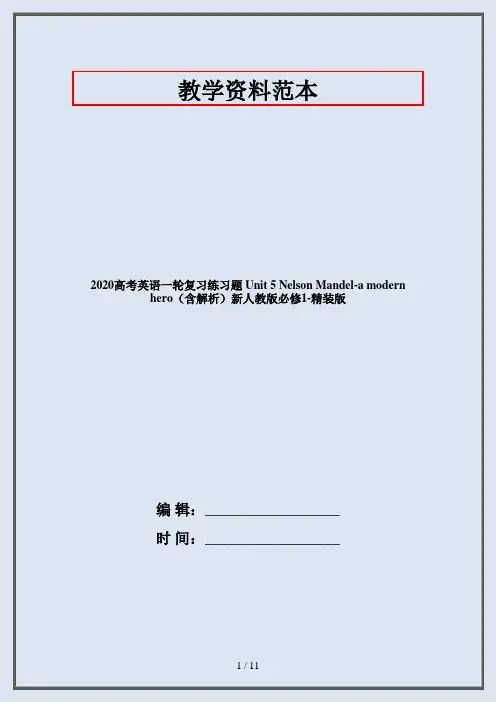
教学资料范本2020高考英语一轮复习练习题 Unit 5 Nelson Mandel-a modern hero(含解析)新人教版必修1-精装版编辑:__________________时间:__________________【精选】20xx最新高考英语一轮复习练习题 Unit 5 Nelson Mandel-a modern hero(含解析)新人教版必修1李仕才【阅读理解】For the longest time, many parents blame teen idols for influencing the way their kids act. Have you noticed how teens idolize the celebrities these days? Even, their personal affairs are being followed by kids these days. Take for example the case of Lindsay Lohan and Mary Kate Ashley. They are definitely famous teen stars. But, since they are trying to project an image to satisfy a lot of people in show business, their health and body suffer. Many kids are aware of this problem. But they are easily influenced by these celebrities to exercise and eat less.Living in today’s time and generation is a bit disturbing to a lot of parents. Media, especially as well as the celebrities, have a very powerful influence to drive teenagers to good or bad. It’s good that we can control ourselves to avoid bad things from happening. If not, parents should really be aware and guide their teens to determine what’s in and what’s out.【文章大意】本文主要讲述青少年如何受偶像的影响以及偶像们也受青少年的影响这种社会现象, 以此警示家长们正确利用偶像对孩子们的影响.1. From the passage we can find Lindsay Lohan ________.A. lives an unhealthy lifestyleB. lives a rich and happy lifeC. doesn’t get any exerciseD. sets a good example for teenagers【解析】选A.细节理解题.根据第二段“. . . their health and body suffer”可知她过着不健康的生活, 故选A.2. According to the writer, why are teenagers easily influenced by some TV shows?A. They are tired of school.B. Their celebrity idols appear in many TV shows.C. They’re in their development period.D. They have nothing to do in their spare time.【解析】选C.细节理解题.根据第三段“But teenagers areeasily influenced because teenage years are the period when our personality and identity developments take place”可知青少年是个性等的发展阶段, 易受影响, 故选C.3 Many celebrities have to be on diet________.B. to survive under pressureC. to keep a slim sizeD. to satisfy their teenage fans4. What’s the best title for the passage?A. Parents’ responsibilitiesB. Advice on self-controlC. Bad influences of celebritiesD. Media’s bad influences【解析】选C.主旨大意题.通读全文, 文章主要叙述了明星们对孩子们的不良影响.故选C.Ⅰ教材与语法填空根据教材课文内容,在空白处填入1个适当的单词或括号内单词的正确形式.Nelson Mandela, 1. (bear) on July 18, 1918, is the first black president of South Africa. He 2. (study) law after he entered university. After that he 3. (form) ANC Youth League. Then in 1952 he set up a law office to help poor black people. Because of his fight 4. the government and antiblack laws, he 5. (sentence) to five years of hard labour. Then ANC began 6. (blow) up buildings in 1963 and he was sentenced to prison for life on Robben Island in 1964.Twenty six years 7. (late), he was freed by the white government. In 1994 he was made president of South Africa 8. the government by and for the black people was 9. (final) set up.Nelson Mandela was really 10. great man!答案:1.born 2.studied 3.formed 4.against 5.was sentenced 6.to blow ter 8.and 9.finally 10.aⅡ教材与话题写作(Ⅰ)用本单元所学知识完成下列句子.1.我第一次听说史蒂芬·霍金时,就被他对研究的奉献精神所感动.(the first time; devotion)答案:The first time I heard of Stephen Hawking, I was moved by his devotion to the research.2.在日常生活中,他处于很大的麻烦之中.(in great trouble)答案:In his daily life, he is in great trouble.3.只有求助于电脑时,他才能讲话、阅读和写作.(only when...; turn to)4.他对世界的贡献是无与伦比的.(have no equal)答案:His contributions to the world have no equal.5.在我看来,任何东西都无法回报他对科学的贡献.(in one’s opinion; in reward for)答案:In my opinion, nothing could be in reward for his contributions to science.(Ⅱ)将以上句子连成短文,要求衔接连贯、过渡自然.【完形填空】When you give thanks for help,everyone benefits.Andthe __1__ will last longer than you'd expect:researchers have found that writing thankyou notes raises people's__2__ levels for up to six months.“If you express gratitude in a diary,it makes you happier,but if you __3__ it with the person who helped you,it has the __4__ to bring you two closertogether,”says researcher Jeff Tsang.Lawyer John Kralik experienced this personally.He'd been feeling depressed and __5__ about his life:He'd been divorced and wasn't __6__ with his children.He felt tired from the __7__ hours he devoted to work.At a/an __8__ low point,he remembered his grandfather telling him about the importance of __9__.He decided to write 365 thankyou notes over 365 days,hoping for a/an __10__ change.__13__ by Kralik's experience,I decided to try the__14__ myself.I chose someone from my past whom I'd __15__thanked before:my wonderful highschool English teacher.I wasn't sure if I'd be able to __16__ him,but eventually I found where he lived.In my letter,I thanked him for the __17__ and support that he'd given me years earlier.I may never hear from him __18__,but that isn't the __19__.The letter helped me__20__ my life,and I've been happy now for months.1.A.time B.thoughtsC.effects D.relationship2.cation B.happiness4.A.method B.desireC.energy D.potential5.A.discouraged B.dishonestC.impatient D.surprised6.A.bored B.strictC.close D.honest7.A.limited B.valuableC.delightful D.long8.A.importantly B.particularlyC.physically D.exactly9.A.forgiveness B.achievementC.gratefulness D.patience10.A.positive B.unexpectedC.possible D.instant11.A.wealth B.attitude12.A.generous B.strangeC.brave D.simple13.A.Struck B.InspiredC.Shocked D.Invited14.A.idea B.beliefC.letter D.test15.A.nearly B.frequentlyC.already D.never16.A.remember B.recogniseC.locate D.reward17.A.degree B.moneyC.gift D.guidance18.A.in advance B.in publicC.in return D.in person19.A.case B.pointC.fact D.solution20.A.appreciate B.understandC.face D.review【解题导语】本文是一篇夹叙夹议文.作者通过亲身经历告诉我们这样一个道理:当你对别人表达出感谢之情时,你会变得更快乐.1.C 考查名词辨折.根据“benefits”并结合第一段可知,此处指感谢别人对自己的影响要比你预想的长久.C项意为“效果,影响”,符合语境.A项意为“时间”;B项意为“想法”;D项意为“关系”,均与语境不符.故答案选C.2.B 考查名词辨析.根据语境可知,此处指写感谢信可以提高人们的幸福水平.B项意为“幸福”,符合语境.A项意为“教育”;C项意为“收入”;D项意为“健康”,均与语境不符.故答案选B.3.A 考查动词辨析.根据此句中的“bring you two closer together”可知,此处指与帮助你的人分享这件事.share sth.with sb.意为“与某人分享某物”,符合语境.B项意为“完成,实现”;C项意为“比较”;D项意为“离开”,均与语境不符.故答案选A.4.D 考查名词辨析.根据语境可知,此处指如果你与帮助你的人一起分享感激之情,这就有可能将你们两人之间的距离拉近.D项意为“可能性,潜能”,符合语境.A项意为“方法”;B项意为“欲望”;C项意为“精力”,均与语境不符.故答案选D.5.A 考查形容词辨折.根据该句中的“feeling depressed”可知,此处应用“discouraged”与“depressed”并列,指他对生活感到沮丧. A项意为“泄气的”,符合语境.B项意为“不诚实的”;C项意为“没有耐心的”;D项意为“感到惊讶的”,均与语境不符.故答案选A.6.C 考查形容词辨析.根据本句中的“He'd been divorced”可知,他已经离婚了,并且与孩子也不亲近.C项意为“亲近的,亲密的”,符合语境.A项意为“无聊的”;B项意为“严格的”;D项意为“诚实的”,均与语境不符.故答案选C.7.D 考查形容词辨析.根据“felt tired from”可推知,此处指因为长时间的工作,所以他感到疲劳.D项意为“长的”,符合语境.A项意为“有限的”;B项意为“有价值的”;C项意为“高兴的”,均与语境不符.故答案选D.8.B 考查副词辨析.根据语境可知,他离婚了,和孩子也不亲近,而且工作辛苦,所以这是他人生的低谷.B项意为“尤其,特别”,符合语境.A项意为“重要地”;C项意为“身体上”;D项意为“恰恰,正好”,均与语境不符.故答案选B.9.C 考查名词辨析.根据下文中的“He decided to write 365 thankyou notes”可知,此处指他记起祖父告诉过他感激的重要性.C项意为“感激”,符合语境.A项意为“原谅”;B项意为“成就”;D项意为“耐心”,均与语境不符.故答案选C.11.B 考查名词辨析.根据语境可知,这位律师正处于人生的低谷时期,然后通过写感谢信使得他的态度开始改善.B项意为“态度”,符合语境.A项意为“财富”;C项意为“位置”;D项意为“能力”,均与语境不符.故答案选B.12.D 考查形容词辨析.根据空格后的“expressing thanks”可知,写感谢信只是表达感谢的一个简单的行为.D项意为“简单的”,符合语境.A项意为“慷慨的”;B项意为“奇怪的”;C项意为“勇敢的”,均与语境不符.故答案选D.13.B 考查动词辨析.根据下文可知,“我”也决定写感谢信了.由此推断出,“我”是受了Kralik的经历的鼓舞.B项意为“鼓舞,激励”,符合语境.故答案选B.14.A 考查名词辨析.根据语境可知,“我”决定亲自试试这个想法.A项意为“想法,主意”,符合语境.B项意为“信念”;C 项意为“信”;D项意为“测试”,均与语境不符.故答案选A.15.D 考查副词辨析.根据语境可知,“我”不知道这位高中英语老师的地址,所以他是“我”以前从未感谢过的人.D项意为“从未”,符合语境.A项意为“几乎”;B项意为“经常”;C项意为“已经”,均与语境不符.故答案选D.16.C 考查动词辨析.根据“but eventually I found where he lived”可知,此处指“我”不知道是否能够找到他.C项意为“找出……的准确位置”,符合语境.A项意为“记得”;B项意为“认出”;D项意为“奖励,奖赏”,均与语境不符.故答案选C.17.D 考查名词辨析.根据语境可知,“我”感谢的对象是“我”的一位高中英语老师,所以“我”应是感谢他给予“我”的指导和帮助.D项意为“指导”,符合语境.A项意为“程度,等级”;B项意为“金钱”;C项意为“礼物”,均与语境不符.故答案选D.18.C 考查介词短语辨析.根据常识可知,“我”写感谢信给多年前的老师,而老师不一定会回信给“我”.C项意为“作出回应”,符合语境.A项意为“提前”;B项意为“公开地”;D项意为“亲自”,均与语境不符.故答案选C.19.B 考查名词辨析.根据下文中的“I've been ha ppy now for months”可知,“我”快乐了几个月,所以此处指老师是否回信不是重点.B项意为“重点,要点”,符合语境.A项意为“事例”;C项意为“事实”;D项意为“解决方法”,均与语境不符.故答案选B.20.A 考查动词辨析.联系全文的内容可知,文章主要是关于表达出感谢可以给自己带来快乐,所以此处指这封感谢信帮助“我”感激“我”的生活,“我”为此快乐了几个月.A项意为“感激”,符合语境.B项意为“理解”;C项意为“面对”;D项意为“回顾”,均与语境不符.故答案选A.Ⅲ下面是李华的一篇作文,文中有五处错误,改正错误并背诵该文.答案:11 / 11。
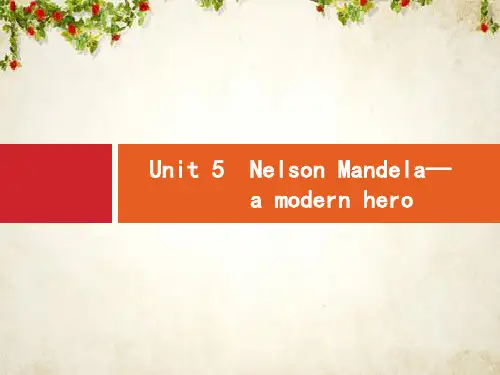
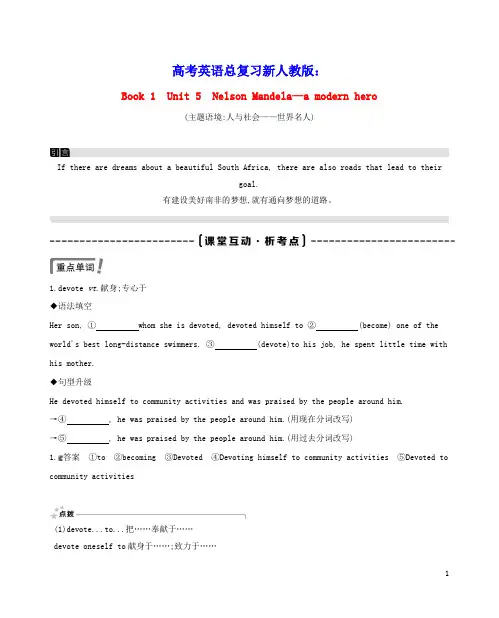
高考英语总复习新人教版:Book 1 Unit 5 Nelson Mandela—a modern hero(主题语境:人与社会——世界名人)If there are dreams about a beautiful South Africa, there are also roads that lead to theirgoal.有建设美好南非的梦想,就有通向梦想的道路。
1.devote vt.献身;专心于◆语法填空Her son, ①whom she is devoted, devoted himself to ②(become) one of the world's best long-distance swimmers. ③(devote)to his job, he spent little time with his mother.◆句型升级He devoted himself to community activities and was praised by the people around him.→④, he was praised by the people around him.(用现在分词改写)→⑤, he was praised by the people around him.(用过去分词改写)1.答案①to ②becoming ③Devoted ④Devoting himself to community activities ⑤Devoted to community activities(1)devote...to...把……奉献于……devote oneself to献身于……;致力于……(2)devoted adj.忠实的;挚爱的be devoted to...专心于……;奉献于……(3)devotion n.关爱;关照;奉献;忠诚联想含有介词to 的短语:(1)look forward to doing sth.盼望做某事;(2)object to doing sth.反对做某事;(3)get down to doing sth.开始做某事;(4)be/get accustomed to doing sth.习惯于做某事。
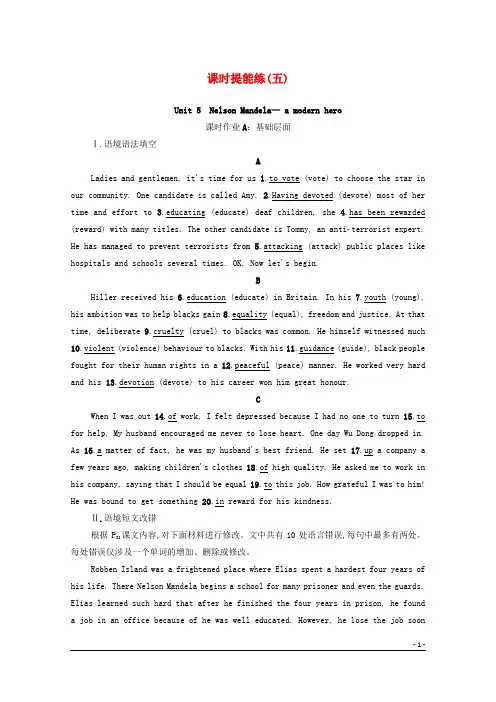
课时提能练(五)Unit 5Nelson Mandela— a modern hero课时作业A:基础层面Ⅰ.语境语法填空ALadies and gentlemen, it's time for us 1.to vote (vote) to choose the star in our community. One candidate is called Amy. 2.Having devoted (devote) most of her time and effort to cating (educate) deaf children, she 4.has been rewarded (reward) with many titles. The other candidate is Tommy, an antiterrorist expert. He has managed to prevent terrorists from 5.attacking (attack) public places like hospitals and schools several times. OK. Now let's begin.BHiller received his cation (educate) in Britain. In his 7.youth (young), his ambition was to help blacks gain 8.equality (equal), freedom and justice. At that time, deliberate 9.cruelty (cruel) to blacks was common. He himself witnessed much 10.violent (violence) behaviour to blacks. With his 11.guidance (guide), black people fought for their human rights in a 12.peaceful (peace) manner. He worked very hard and his 13.devotion (devote) to his career won him great honour.CWhen I was out 14.of work, I felt depressed because I had no one to turn 15.to for help. My husband encouraged me never to lose heart. One day Wu Dong dropped in. As 16.a matter of fact, he was my husband's best friend. He set 17.up a company a few years ago, making children's clothes 18.of high quality. He asked me to work in his company, saying that I should be equal 19.to this job. How grateful I was to him! He was bound to get something 20.in reward for his kindness.Ⅱ.语境短文改错根据P38课文内容,对下面材料进行修改。
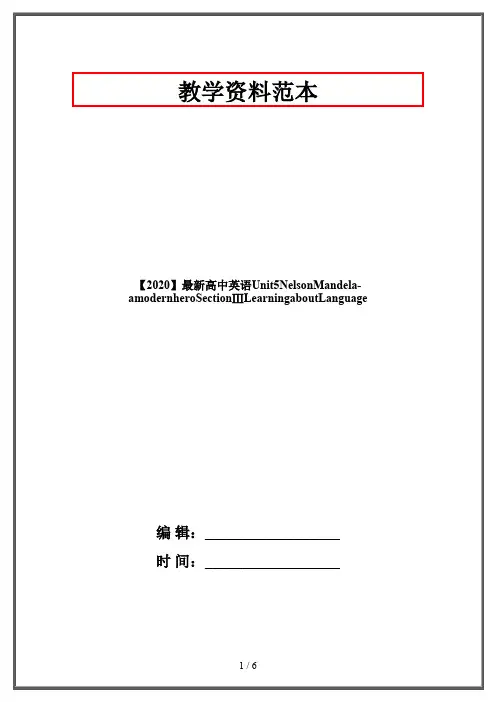
矿产资源开发利用方案编写内容要求及审查大纲
矿产资源开发利用方案编写内容要求及《矿产资源开发利用方案》审查大纲一、概述
㈠矿区位置、隶属关系和企业性质。
如为改扩建矿山, 应说明矿山现状、
特点及存在的主要问题。
㈡编制依据
(1简述项目前期工作进展情况及与有关方面对项目的意向性协议情况。
(2 列出开发利用方案编制所依据的主要基础性资料的名称。
如经储量管理部门认定的矿区地质勘探报告、选矿试验报告、加工利用试验报告、工程地质初评资料、矿区水文资料和供水资料等。
对改、扩建矿山应有生产实际资料, 如矿山总平面现状图、矿床开拓系统图、采场现状图和主要采选设备清单等。
二、矿产品需求现状和预测
㈠该矿产在国内需求情况和市场供应情况
1、矿产品现状及加工利用趋向。
2、国内近、远期的需求量及主要销向预测。
㈡产品价格分析
1、国内矿产品价格现状。
2、矿产品价格稳定性及变化趋势。
三、矿产资源概况
㈠矿区总体概况
1、矿区总体规划情况。
2、矿区矿产资源概况。
3、该设计与矿区总体开发的关系。
㈡该设计项目的资源概况
1、矿床地质及构造特征。
2、矿床开采技术条件及水文地质条件。
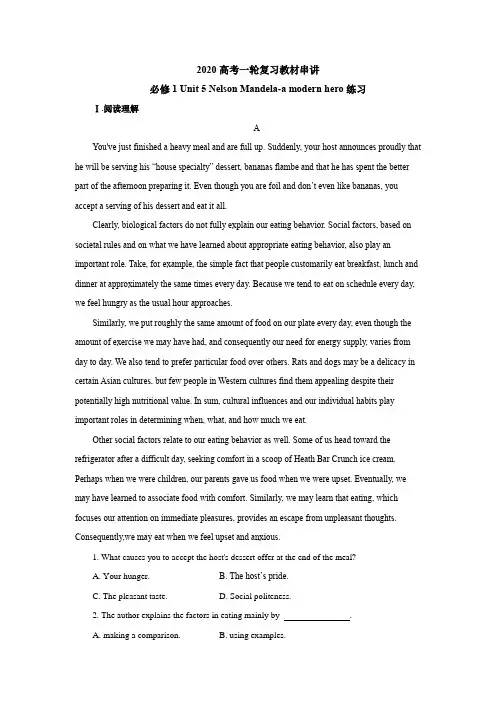
2020高考一轮复习教材串讲必修1 Unit 5 Nelson Mandela-a modern hero练习Ⅰ.阅读理解AYou've just finished a heavy meal and are full up. Suddenly, your host announces proudly that he will be serving his “house specialty” dessert, bananas flambe and that he has spent the better part of the afternoon preparing it. Even though you are foil and don’t even like bananas, you accept a serving of his dessert and eat it all.Clearly, biological factors do not fully explain our eating behavior. Social factors, based on societal rules and on what we have learned about appropriate eating behavior, also play an important role. Take, for example, the simple fact that people customarily eat breakfast, lunch and dinner at approximately the same times every day. Because we tend to eat on schedule every day, we feel hungry as the usual hour approaches.Similarly, we put roughly the same amount of food on our plate every day, even though the amount of exercise we may have had, and consequently our need for energy supply, varies from day to day. We also tend to prefer particular food over others. Rats and dogs may be a delicacy in certain Asian cultures, but few people in Western cultures find them appealing despite their potentially high nutritional value. In sum, cultural influences and our individual habits play important roles in determining when, what, and how much we eat.Other social factors relate to our eating behavior as well. Some of us head toward the refrigerator after a difficult day, seeking comfort in a scoop of Heath Bar Crunch ice cream. Perhaps when we were children, our parents gave us food when we were upset. Eventually, we may have learned to associate food with comfort. Similarly, we may learn that eating, which focuses our attention on immediate pleasures, provides an escape from unpleasant thoughts. Consequently,we may eat when we feel upset and anxious.1. What causes you to accept the host's dessert offer at the end of the meal?A. Your hunger.B. The host’s pride.C. The pleasant taste.D. Social politeness.2. The author explains the factors in eating mainly by .A. making a comparison.B. using examples.C. analyzing the data.D. undertaking a survey.3. Which of the following might be the best title for the text?A. Social Factors in Eating.B. Causes of Hunger.C. Table Manners at Meals.D. Cultural Differences in Eating.BMeditation has been around for thousands of years, starting as a religious practice. Hindu(印度教)holy books from around 1500 BC describe meditating on the divine (神),and art from this time period shows people sitting cross-legged and alone in a garden. In China and India around the fifth century BC, other forms of mediation developed. Several religions, including Taoism, Buddhism, Islam, and Christianity, had meditative ceremonies. In 20th-century Europe and America, secular meditation arrived from India. Rather than focusing on spiritual growth, it emphasizes stress reduction, relaxation, and self-improvement.Although it still isn't exactly mainstream, many people practice meditation. Mindfulness meditation, in particular, has become more popular in recent years. The practice involves sitting comfortably, focusing on one's breathing, and bringing the mind's attention to the present. Concerns about the past or future are let go of. An individual can picture worries popping like a bubble or flying away like a butterfly.Mindfulness is about increasing awareness and practicing acceptance. To be present is to have sharpened attention. According to the Mayo Clinic, "Meditation can give you a sense of calm, peace and balance that benefits your emotional well-being. "Among the emotional benefits are reducing negative emotions, increased self-awareness, and stress management skills. Asthma, depression, and sleep disorders are all conditions worsened by stress. Several studies have shown that patients with these conditions benefit from meditation.Dr. Robert Schneider, director of the Institute for Natural Medicine and Prevention, says, "I have been researching effects of meditation on health for thirty years and have found it has persuasive benefits. The benefits of meditation are coming to be widely accepted by health professionals business leaders and the media. It is now time for the medical profession to catch up. "4. The underlined word “secular” in paragraph 1 most nearly means .A. non-religious .B. non-traditional.C. serious.D. daily.5. When you are deep in meditation, you will .A. feel tired very soonB. have sleep disordersC. sense calm and peaceD. experience more negative emotions6. What is the main idea of the text?A. One's mental health is supposed to come first in life.B. Medicine is no more effective than meditation for patients.C. Mindfulness meditation helps practitioners focus on mental health.D. Mindfulness meditation is getting more accepted due to its benefits.Ⅱ.语篇填空Mr.James owns a company.He put an advertisement 1. a newspaper for a boy to work in his office.Out of nearly fifty people 2.came to apply,the man selected one and dismissed 3.others.“I would like to know,” said a friend,“the reason you preferred that boy,who brought neither a single letter,4. a single recommendation.”“You are wrong,” said the gentlemen.“He had many.He wiped his feet at the door and closed the door behind him,5.(mean) that he was careful.He gave his seat immediately to an old man,showing that he was kind and 6.(thought).He took off his cap when he came in and answered my questions quickly,showing that he was a polite gentleman.Everyone else stepped over the book that I 7.(put) on the floor purposely.He picked 8.up and placed it on the table,and he waited quietly for his turn instead of pushing and crowding.When I talked to him,I noticed his tidy clothing,his 9.(neat) brushed hair,and his clean fingernails.Can’t you see that these are excellent recommendations?I considered them to be more significant than 10.(letter).”Hearing the words,the friend nodded in agreement.Ⅲ. 书面表达假设你是红星中学学生会主席李华。
第 1 页 共 1 页
2020年高考英语复习《必修一Unit 5 Nelson Mandela-amodern hero》:
单句语法填空
1.You can't imagine the trouble I had persuading (persuade) him to change his mind.
2.With economy developing at great speed,our city has witnessed (witness) quite a few
changes in recent years.
3.The first time they visited the Science Museum,they showed great interest in everything
they saw.
4.The company rewarded him for his years of service with a grand party and several
presents.
5.Thanks for your support and guidance (guide) in this job.
6.In the last ten years the small town has seen (see) the great changes of our country.
7.This position is equally (equal) suitable for a school leaver or for somebody who has office
experience.
8.Although he made a serious mistake in his work,he was lucky to escape being fired (fire)
by his boss.
9.Love is selfish,while friendship is selfless.(self)
10.They also tend to be more educated,and education is one of the strongest factors of good
health.(educate)